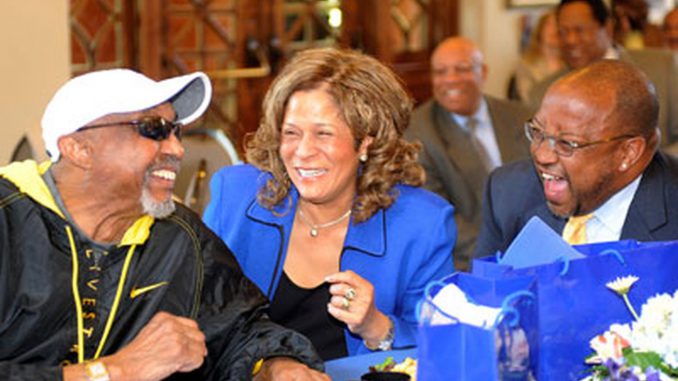
Reflections on a Life Well Lived: A Collection of Thoughts and
Reminiscences on Coach John Chaney from C. Vivian Stringer
“Imitation is the sincerest form of flattery. . . .” Oscar Wilde
Credit Source/Photo Source: Rutgers University Athletics
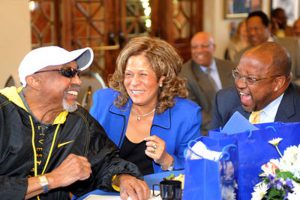
Coach John Chaney has been the person I have strived most to imitate and emulate throughout my professional career. I have known Coach Chaney for 48 years – – almost a half-century. At many levels, he was singularly responsible for the Coach I have become – – my basketball career, my basketball brand, and the incredible life I have been blessed to lead. In a very large part, much of the success I have enjoyed was due to his teaching, tutelage, and invaluable mentorship. His style became my own; we thought alike; we taught alike; we practiced alike; and our philosophical conversations on basketball fundamentals were both epic and enlightening.
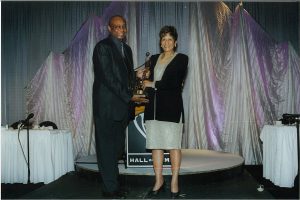
Coach Chaney arrived at Cheyney State a year after me, in 1972. He was the first coach, male or female, that took the time to teach and mentor me on the game of basketball. John broke the game down into its finest points. I used to play his practice tapes and would try to finish his sentences; that is how well I studied him as a coach as well as his basketball philosophy. I will never forget the years we shared a gym, which allowed us to combine our practices. Often times the Cheyney State men’s and women’s teams would practice together. One day I would lecture both teams, and other days he would lecture both teams. John didn’t mind it; he taught his team about appreciating women, and that women were never to be treated “less-than”.
Our opponents often said if you want to beat Vivian’s teams, all you have to do is study John’s tapes, and vice versa. Because we were such a financially-challenged school, both the men’s and women’s teams at Cheyney State took care of each other and shared resources such as equipment and meals. It was a true family affair. Coach Chaney and I spent ten years together at Cheyney State, and this was the foundation for our professional relationship as well as our life-long friendship. His Cheyney State team won the championship in 1978. In 1982, Coach Chaney went to Temple, and a year later I left for Iowa. Even though we were separated by all those miles after we left Cheyney State, we led our respective teams, he at Temple and I at Iowa, to the number one ranking in the same year in 1988, and we both were inducted into the Naismith Memorial Basketball Hall of Fame years later.
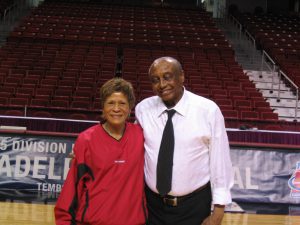
Our shared history and experiences have allowed me a unique perspective from which to view his actions on the basketball court. I was able to see his work through his eyes because I knew how John thought and felt about the game. Every major aspect and minor nuance of basketball ran through his blood. He lived out his destiny as the “Godfather of Defense” with an offensive strategy that was rooted in not allowing turnovers, not under any circumstances.
John knew that in the game of basketball, heart and attitude, coupled with good defense and no turnovers, were the Coach Chaney recipe to winning games. He changed the game of basketball with his dreaded matchup zone, which some of the best minds in college basketball have failed to unravel. He maintained that winning is an attitude, and you must expect and overcome the obstacles placed in your way, despite bad calls. Don’t expect any calls in your favor. Sometimes we have to be better than everyone else in order to win. He was so passionate about the game of basketball that after unfair calls from referees he often would showcase his disapproval for the public’s benefit by calling timeout and then employing a gaze which he dubbed the “One-Eyed Jack.”
After retiring from the game, and even as recently as last week for his birthday when we last spoke, John always started our calls with “how many games have you lost?” “How many turnovers has your team had this season?” If I didn’t rattle off the correct stats quickly, or if I tried to evade his questions and respond, “I don’t know,” he would say, “Yes you do. You do know. I taught you better than that; you know better than that. Since you left to coach at Iowa/Rutgers, you’ve adopted this (55 defense) full court press where the turnover stats don’t mean as much, but you know fewer turnovers are the key to winning the game.”
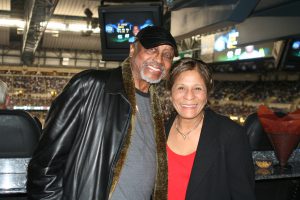
We should all acknowledge and honor the monumental legacy Coach Chaney left behind based on who he was, and what he stood for. He was fearless in dealing with the struggles and obstacles that older black coaches encountered and had to overcome in order to open doors for the younger generation of black coaches and athletes to have chances to advance and succeed. Coach wanted everyone to have an equal opportunity to succeed in college and in life regardless of socio-economic backgrounds, lack of resources, or obstacles to educational success. He would often say, “Don’t raise the ceiling without raising the floor,” and he fought for what was best for all student athletes. He worked to make sure that those who were first in their families to attend college matriculated and graduated thanks to his efforts. He picked unpopular fights and lashed out at those NCAA policies he found discriminatory. He was a de facto father to his players, and often said his biggest goal was simply to give poor kids a chance to get an education. The man belongs in the Basketball Hall of Fame for what he has accomplished, both on and off the court in the lives of his players and anyone else he came into contact with.
Out of all of the things I have copied from my mentor, the hardest thing to maintain has been his notorious 5:30 AM practices; I am a night owl. Nonetheless, I did it, just because he did and that’s how he taught me. Even his early practices had a proverbial wisdom behind them; early to bed, early to rise. . . . Coach would schedule early difficult practices to ensure his players went to bed early and, therefore, were less likely to go out late at night. Furthermore, practicing from 5:30 AM to 8 AM each morning ensured none of his players were ever late or missed the first scheduled morning classes of the day. This was just another of the many examples of John knowing what was best for his players and resolute in his determination to always act in their best interest.
Coach was compassionate, entertaining, tender, funny, and loved telling stories. His retirement news conference was a platform not to discuss basketball, rather he addressed education’s role in helping the poor and disadvantaged. He was a creature of habit, a Philly original, who always said what he meant and stood by it, right or wrong.
John would say things like, “If we have 80 possessions and only take 60 shots, I want to know what the hell happened to those other 20 possessions.” He talked about the three R’s: rules, roles, and responsibility and would tell players that “with a good attitude, you can accomplish so much. . . You’re growing up in a society that’s neglected your outcry of what’s right and what’s wrong. Identify the people who pour their hearts out for you, then work like the dickens to get it right. You should never lose by default. Be the first to say, ‘I could have done better.’ Make good decisions.”
Coach Chaney always commanded all of the attention in a room. He often would sit in his office after a game until the wee hours of the morning talking to friends, family, or fans for as long as they wanted. He could talk about anything; he was well versed in all aspects of life and culture, from the NCAA and politics to who makes the best chitterlings. He could scream at you for 15 minutes, then greet you the following day as if nothing happened. He was someone who recited poetry, dressed to the nines, yet could show up for functions sporting what amounted to a sweat suit.
John’s career in basketball was not an easy nor smooth one. His heart was always in the right place and he had faith, determination, and perseverance. He was respected, trusted, and loved. There was no room for excuses in John’s world, not even good ones. This was John at his core. From the compassion he had for the plight of all of those who are less fortunate, to the endless support he gave to me, my family, and many others in our coaching careers. John was all about his players, his school, his friends, his family, and his city.
There was no decision I ever made in my basketball career that I didn’t discuss with him first. He was so powerful and strong; I felt that by constantly imitating him for the last 48 years in all of my games, my wins were de facto his wins; in that way, he carried both of us into the Naismith Memorial Basketball Hall of Fame.
There are countless lessons, styles, and examples that I have observed and gained over the years about Coach Chaney. John set the bar high; I accepted the challenge to follow in his footsteps, teachings, and examples which served as the foundation of the success we both saw in our careers. He taught that success is about showing up, learning, and bringing your best every single day. He said to strive to exhibit selfless acts of kindness and compassion to everyone. After all, life really is not about accomplishments, wins or losses; it’s about investing in people and relationships. And, he said, the greatest reward in life is a result of sacrificing yourself for another human being in order to help them become their best.
The legacy John Chaney built from the ground up can be seen in the spirit of all current minority coaches and players who are comfortable in speaking up for noteworthy causes that concern us today. He was a fighter and a competitor. He did not accept mediocrity. In his eyes, there was always more to be done to improve conditions for those who needed it – -we should always strive for more. Coach cared and showed that by the endless hours he spent teaching our young people and all those whose lives he touched. Coach Chaney did anything and everything he could to not only win games but, most important, to influence lives — young and old — family, players, fans, friends, administrators, colleagues, former coaches, and teammates. This is a legacy we must all continue today in his honor.
John didn’t just say inspirational things, he did inspirational things on a daily basis, whether the cameras were on or off. He didn’t just pay lip service to his mantras about the game of basketball and life; he lived his life in accordance with what he believed. He was generous, charitable, and donated his time talking to Philly youth of all ages; he spoke at camps, schools, and events in the tristate area. He was a down-to-earth person who cared about people and would take time to speak to anyone who wanted to speak to him.
John fought battles to create opportunities for all of us and taught us how to win when it appeared the cards were stacked against us. During the Black Coaches Association (BCA) meetings, for example, John Chaney and his good friend and colleague Coach John Thompson, (Georgetown) both stepped up to assume responsibility for speaking on behalf of all of us black coaches on controversial issues. Big John and Little John, as we called them, took the heat because they were established in their careers and had the support of their respective schools to weather the storms and not be fired for raising issues. He didn’t just make us all better; he made us the best at who we were trying to become.
He touched so many lives. Coach Chaney was a father, friend, leader, mentor, hero, humanitarian, talented basketball player, and an iconic often-imitated-never-duplicated basketball coach. He was a powerful force of nature who I believed in absolutely and copied consistently. I know that God has a special place reserved for him in heaven.
I remember all of this about John Chaney, and I am left with only one conclusion: there will never be another coach, here or anywhere else, like the incomparable John Chaney. I will carry him in my heart and soul, forever. His presence in my life was transformative, and the time we spent together priceless. I hope his family knows I am forever indebted to him for all that he instilled in me. My condolences are deep and endless for our shared loss.

Leave a Reply
You must be logged in to post a comment.